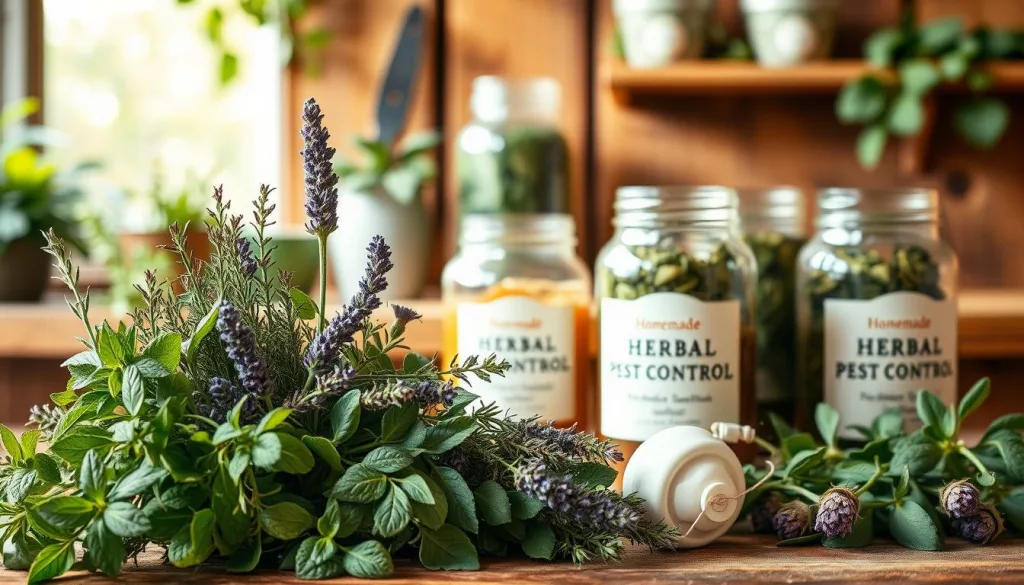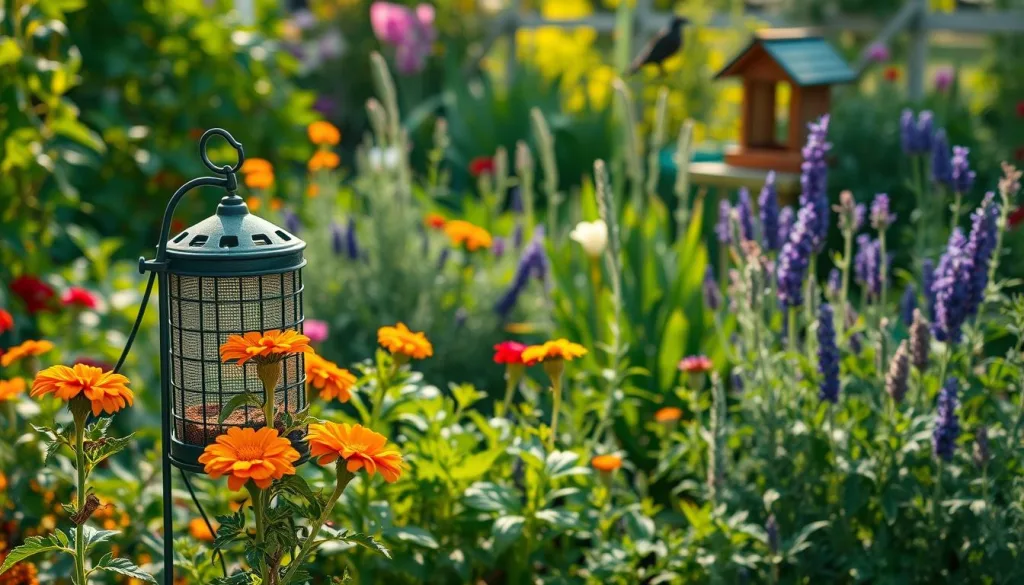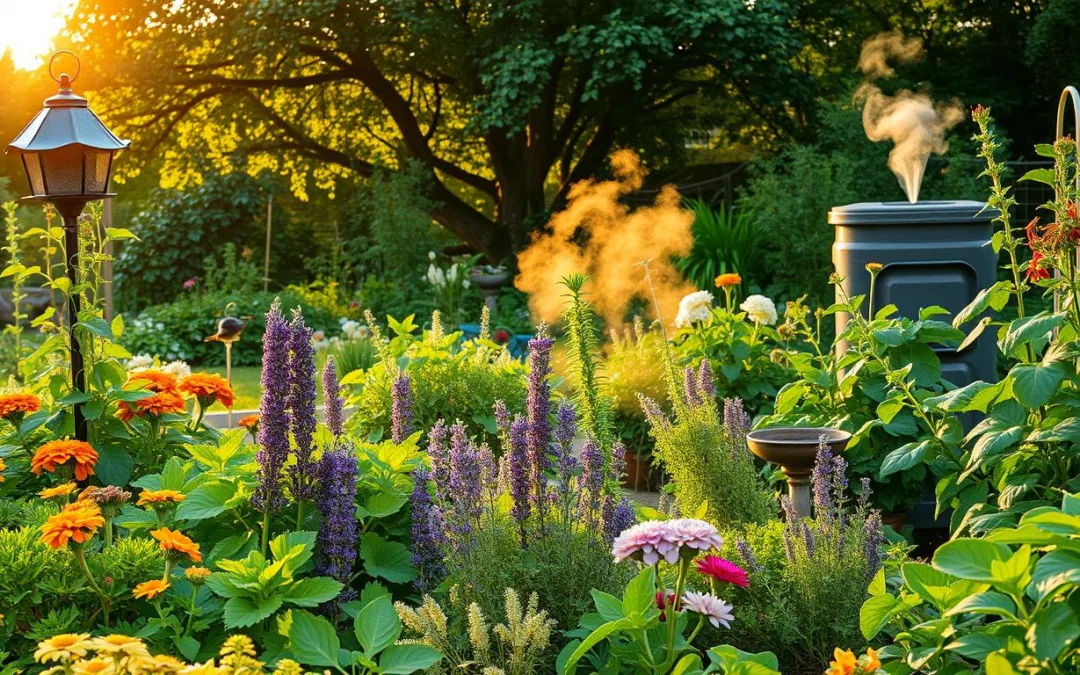Keeping your home pest-free doesn’t need harsh chemicals. Now, about 40% of homeowners choose natural pest control. These methods are safe, work well, and are good for the planet.
There are new ways to protect your home without toxic chemicals. You can use kitchen items and essential oils. These natural solutions help keep your home pest-free and safe for your family.
Pest control experts found that common household items can fight pests. For example, garlic can keep away up to 80% of certain bugs. Also, a mix of liquid soap and water can kill many pests with a 70% success rate.
Key Takeaways
- Natural pest control methods are safe and environmentally responsible
- Household ingredients can be powerful pest deterrents
- Chemical-free solutions protect family health
- Many natural methods are cost-effective and easy to implement
- Eco-friendly approaches support overall environmental wellness
Understanding the Importance of Chemical-Free Pest Management
Keeping our homes pest-free is a big task. We need a plan that works well and is safe. Organic pest prevention is a great choice. It’s better for families, pets, and the planet.
Green pest control is a whole new way to deal with pests. It makes our homes healthier and helps the environment too.
Environmental Benefits of Natural Solutions
Natural pest control is good for the earth:
- It keeps good bugs safe
- It cuts down on pollution in soil and water
- It helps keep our ecosystems balanced
- It reduces chemical pollution
Studies show that using natural predators can cut pest numbers by 70-90%. Things like changing what we grow and planting certain plants together can also help. This makes our environment stronger.
Health Advantages for Family and Pets
Going chemical-free is better for our health:
- It keeps us away from bad chemicals
- It lowers the chance of allergies
- It keeps our kids and pets safe from harmful stuff
- It makes our homes safer
Cost-Effectiveness of Natural Methods
Even though organic pest control might cost more at first, it’s worth it in the long run. Using Integrated Pest Management (IPM) can cut down pesticide use by up to 50%. This saves money and makes taking care of our homes easier.
Sustainable pest management is not just a choice—it’s a commitment to healthier living and environmental stewardship.
Kitchen Ingredients as Powerful Pest Deterrents
Discovering chemical-free pest remedies in your kitchen can change how you fight pests. Tampa Bay’s climate is perfect for insects, making natural solutions key for homeowners.
Here are some kitchen ingredients that keep pests away:
- Coffee Grounds: Sprinkle used coffee grounds around entry points to keep ants away
- Apple Cider Vinegar: Use a vinegar and water mix to disrupt ant trails and repel fruit flies
- Banana Peels: Bury chopped peels near plants to keep aphids away
Here are some ways to remove pests naturally:
- Mix 1 cup of apple cider vinegar with water for an ant-repelling spray
- Sprinkle dried coffee grounds around your home’s foundation to block insects
- Use banana peel extract as a natural aphid deterrent in your garden
These pest remedies are safe for families and pets. By using kitchen ingredients, you can protect your home without harsh chemicals.
Essential Oils and Natural Pest Control Methods
Essential oils are a strong tool for fighting pests without harming the environment. These plant extracts are safe and effective for keeping your home pest-free. Let’s see how they can protect your space from pests.
Studies show essential oils are great for controlling pests. A 2005 study found thyme oil works well against houseflies and mosquitoes. Other oils also have strong pest-repelling powers:
- Basil oil: Keeps mosquitoes away and kills larvae
- Peppermint oil: Kills larvae in just 24 hours
- Eucalyptus: Keeps blood-sucking insects at bay
- Lavender oil: Makes a strong natural bug spray
Popular Essential Oil Combinations
Using the right mix of oils is key for effective pest control. Blending oils can make natural pest control even better. Here are some powerful mixes:
- Tea tree and peppermint oil for bug bites
- Clove and cinnamon oil for keeping pests away
- Lemon eucalyptus distillate for long-lasting mosquito protection
Application Techniques and Safety Tips
“Nature provides the most powerful pest control solutions when used correctly.”
It’s important to dilute essential oils correctly for safe use. Here are some guidelines:
- Clove oil: 10-15 drops per quart of water
- Cinnamon oil: 5-10 drops per quart of water
- Garlic extract: 1-2 tablespoons per quart of water
Target-Specific Oil Solutions
Each pest needs a special approach. Garlic extract is great for ants and aphids, while cinnamon oil fights fungal diseases. By choosing the right oils, you can make a pest control plan that’s just right for your home.
Herb-Based Solutions for Common Household Pests

Looking for eco-friendly ways to keep pests out of your home? Herbs are a great choice. They’re not only effective but also safe for your family and pets. Plus, they make your home look and smell great.
Here are some amazing ways herbs can help control pests:
- Basil: An exceptional fly repellent that works perfectly near doorways and patios
- Rosemary: Excellent for deterring mosquitoes during outdoor gatherings
- Sage: Creates a natural barrier against various household insects
It’s simple to make your own pest management solutions with herbs. Coffee grounds, for example, can keep pests away with their strong smell. By placing these herbs and natural items in the right spots, you can keep pests out without harming the environment.
The ultimate goal is creating health in soil and plants to prevent pest issues from arising naturally.
Did you know 70% of homeowners choose eco-friendly pest control over chemicals? Using natural methods not only protects your home but also helps the planet.
| Herb | Pest Deterred | Application Method |
|---|---|---|
| Sweet Basil | Flies | Plant near entryways |
| Rosemary | Mosquitoes | Burn fresh sprigs outdoors |
| Sage | Multiple insects | Create herbal sachets |
DIY Natural Repellent Sprays and Solutions
Using non-toxic pest management doesn’t mean you have to give up on effectiveness. Green pest control offers strong alternatives to harmful chemicals. Natural home remedies can change how you fight pests, making your home safer and more eco-friendly.
Citrus-Based Repellent Recipes
Citrus oils are a powerful tool in natural pest control. Studies from 2022 show they can keep ants and other pests away. Here’s a simple recipe for a citrus spray:
- 2 cups of water
- 10-15 drops of citrus essential oil (lemon, orange, or grapefruit)
- 2 tablespoons of liquid soap
Vinegar-Based Pest Control Mixtures
Vinegar is great for non-toxic pest control. You can make a bug spray for indoors and outdoors with just a few ingredients:
| Ingredient | Quantity |
|---|---|
| White Vinegar | 2 ounces |
| Distilled Water | 2 ounces |
| Essential Oils | 10-20 drops |
Essential Oil Spray Formulations
Essential oils are powerful natural pest deterrents. Some top choices include:
- Peppermint oil: Repels mosquitoes, ants, and flies
- Lavender oil: Effective against mosquitoes
- Cinnamon oil: Shown to repel and kill mosquito larvae
When making your own green pest control, test it first on a small area. The Environmental Protection Agency lists many natural ingredients as safe pesticides. This gives you confidence in using these natural methods to manage pests.
Safety tip: Avoid applying essential oils directly to skin, and always dilute with a carrier liquid like witch hazel or water.
Garden-Friendly Pest Control Strategies

To have a thriving garden, we need smart ways to keep pests away. These methods should protect our plants and the environment. It starts with knowing the balance of your garden’s ecosystem.
Companion planting is a key strategy for controlling pests naturally. By placing certain plants together, we can fight off harmful.
- Umbelliferous flowers attract beneficial insects like hoverflies and lady beetles
- Healthy plants naturally resist pest infestations
- Integrated pest management can reduce pesticide use by 20-50%
Biological controls are vital for garden health. Ladybugs can cut aphid numbers by up to 80%. Birds and frogs are also great helpers – a single bat can eat 8,000 insects in one night!
Nature provides the most effective pest control when we work with its systems, not against them.
Practical methods like neem oil, diatomaceous earth, and crop rotation help fight pests. By using these methods, gardeners can grow strong, healthy gardens.
Prevention and Maintenance Techniques
To keep your home pest-free, start with prevention. Use smart techniques to stop pests before they become a big issue.
Entry Point Management
Pests can sneak in through tiny openings. Insects can get in through gaps as small as a quarter. Check your home’s outside carefully:
- Seal cracks around windows and doors
- Check foundation walls for possible entry points
- Keep a clear 18-inch path around your home’s foundation
- Inspect weatherstripping and fix any damage
Natural Barrier Methods
Use natural ways to keep pests out. Here are some effective methods:
- Sprinkle diatomaceous earth around entry points
- Use essential oil-based repellents near windows and doors
- Plant pest-deterring plants around your home
“Prevention is always more effective than treatment when it comes to pest control.” – Pest Management Professionals
Seasonal Prevention Strategies
Pest problems change with the seasons. Here’s how to stay ahead:
- Spring: Deep clean and seal entry points
- Summer: Reduce outdoor attractants like standing water
- Fall: Inspect and seal winter shelter areas
- Winter: Remove clutter that pests might hide in
Integrated Pest Management (IPM) says regular maintenance can cut pest numbers by 20-30%. By using these natural methods, you’ll protect your home from pests.
Conclusion
Natural pest control methods have changed how we manage pests at home. By using holistic pest removal strategies, we can make our homes safer and more sustainable. This approach is more than just a quick fix; it’s a long-term solution.
Exploring natural pest control shows us the power of eco-friendly solutions. We’ve seen how beneficial insects and essential oils can keep pests away. Diatomaceous earth, neem oil, and planting with friends of plants are great alternatives that protect our homes and nature.
Success in pest management comes from being consistent and understanding. By using these natural methods, you’ll not only fight pests but also help the environment. Remember, every home is different, so you might need to try a few things to find what works best.
Choosing natural pest control is more than a choice; it’s a commitment to living sustainably. As we become more aware of our impact on the planet, these green solutions are a bright future. Your decisions today can make your home a safer, more balanced place for years to come.
FAQ
Are natural pest control methods really effective?
How long does it take for natural pest control methods to work?
Are natural pest control methods safe for children and pets?
Can I use natural pest control methods in my vegetable garden?
Which essential oils are most effective for pest control?
How often should I apply natural pest control methods?
Can natural pest control methods completely eliminate all pests?
Are natural pest control solutions cost-effective?
How do I prevent pests from entering my home?
Can I combine different natural pest control methods?
Source Links
- Natural Pest Control Methods: Pros and Cons – https://www.davespestcontrol.com/blog/12-natural-pest-control-strategies/
- 10 Natural Pest Control Remedies for Your Home (Keep Insects Away Naturally) – https://www.familyhandyman.com/list/natural-pest-control-remedies-for-your-home/?srsltid=AfmBOoqP4J0ATsVbbgdh3eRihhOASrwMk-Oym8fRMkfX2-_t4-54IRvo
- Organic Pest Control Methods – https://heropestcontrol.com/organic-pest-control-methods/
- Embracing Chemical-Free Pest Control: A Sustainable Approach for a Healthy Environment – Ultimate Pest Control – https://ultimatepestcontrol.ie/chemical-free-pest-control/
- 10 Natural Insect Repellents For Your Home | Your Green Team – https://yourgreenteam.com/blog/10-natural-insect-repellents-for-your-home/
- Common Kitchen Ingredients You Can Use For DIY Pest Control – House Digest – https://www.housedigest.com/1511638/ingredients-use-diy-pest-control/
- 10 Essential Oils that Naturally Repel Insects (Updated July 2024) | American College of Healthcare Sciences – https://achs.edu/blog/green-cleaning-repel-insects/
- Smart Composting for Earth Day: Reencle Smart Composter Appliance – https://jeden.bio/essential-oils-to-control-mites-insects/
- 10 Natural Pest Control Remedies for Your Home (Keep Insects Away Naturally) – https://www.familyhandyman.com/list/natural-pest-control-remedies-for-your-home/?srsltid=AfmBOorYFWZLWEBlfn-LwTU5hW_pXxgARxHB2r1hhUq7u5ySyvOqMnvY
- Non-Toxic Pest Control – The Best Way To Control Pests – https://www.smilinggardener.com/lessons/non-toxic-pest-control/
- Natural Pest Control Methods | Effective Pest Management – Phoenix Pro Landscaping – https://phoenixprolandscaping.com/sustainable-landscaping/natural-pest-control-methods/
- Organic Pest Control Spray for Gardens – https://www.theprairiehomestead.com/2015/07/organic-pest-control-garden-spray.html
- Homemade Bug Spray: Natural Recipes for Your Skin, Home, and Plants – https://www.healthline.com/health/homemade-bug-spray
- 8 Natural & Homemade Insecticides: Save Your Garden Without Killing the Earth – https://www.treehugger.com/natural-homemade-insecticides-save-your-garden-without-killing-earth-4858819
- Natural pest control methods – 7 eco-friendly techniques that won’t harm your garden – https://www.homesandgardens.com/gardens/natural-pest-control-methods
- 6 Effective Strategies for Managing Garden Pests – Unified Home Remodeling – https://www.unifiedhomeremodeling.com/6-effective-strategies-for-managing-garden-pests/
- 15 Natural Pest-Control Strategies for Your Yard and Garden – https://www.bobvila.com/articles/natural-pest-control-for-yard/
- All-Natural Pest Control Tips to Try at Home – https://www.thespruce.com/natural-pest-control-prevention-tips-7090566
- The Natural Pest Control Method that Actually Works – https://www.richlandpestbee.com/blog/natural-pest-control-that-works/
- Pest Control Preventive Maintenance: Maximize Your Property’s Value – https://www.pestshare.com/pest-control-preventive-maintenance/
- Top 10 Natural Pest Control Methods | Enterprise wired – https://enterprisewired.com/top-10-natural-pest-control-methods/
- Natural Pest Control Methods & Eco-Friendly Solutions – https://unitechpest.com/natural-pest-control-methods-eco-friendly-solutions/


